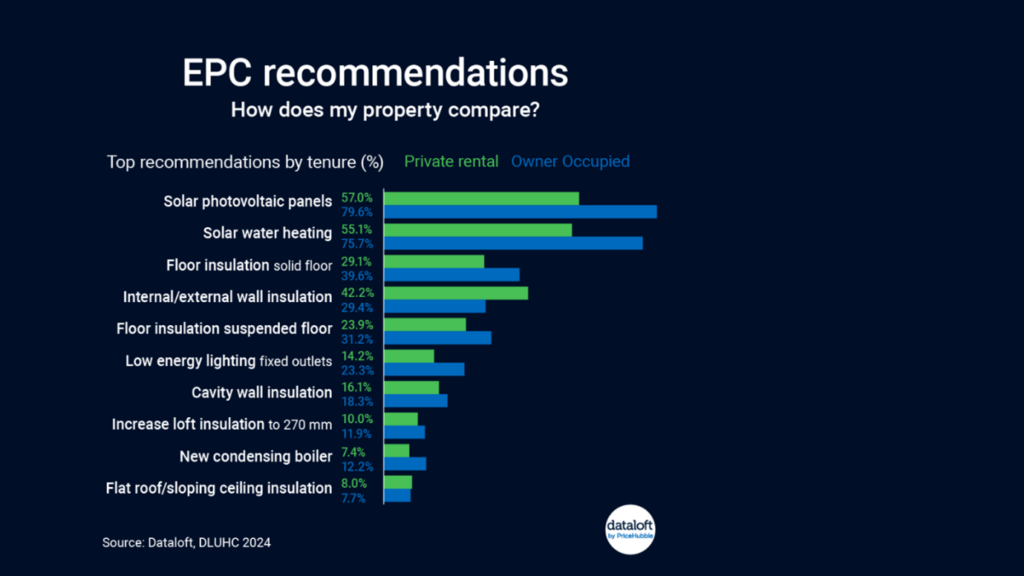Energy Performance Certificates (EPCs) are crucial tools in the UK housing market, serving as a gauge of a property’s energy efficiency. EPCs provide a rating from A (most efficient) to G (least efficient), which not only informs homeowners, landlords and tenants of the current energy performance but also highlights potential improvements to enhance efficiency. This certificate is a mandatory requirement when selling or renting a property.

The Role of EPCs in the Property Market
For homeowners, an EPC can help identify how energy-efficient their property is and what steps can be taken to improve it, potentially increasing the property’s value and desirability. Landlords must provide an EPC to prospective tenants to comply with rental market regulations, which also impacts their property’s rental appeal and compliance with legal standards. Tenants benefit from understanding the likely energy costs associated with a property before committing to a lease.
Dataloft’s Insights into EPC Recommendations
According to a recent analysis by Dataloft, a leading data analytics provider, and findings sourced from the Department for Levelling Up, Housing & Communities (DLUHC) in 2024, there are several common recommendations provided in EPCs aimed at improving a property’s energy efficiency. These include measures such as solar panels, cavity wall insulation, and draught proofing among 41 commonly suggested actions.
Top 10 EPC Recommendations for 2023/24
Dataloft’s comprehensive review of all EPC recommendations across England and Wales for the year 2023/24 highlights the most frequently suggested energy efficiency improvements by tenure:
- Solar Photovoltaic Power: This tops the list, with 57% of all private rental properties and a significant 79.6% of owner-occupied properties being advised to adopt solar technology.
- Cavity Wall Insulation: Often recommended to reduce heating costs and improve home comfort.
- Draught Proofing: A simple yet effective way to enhance a property’s heat retention capabilities.
- LED Lighting: Encouraged for its lower energy consumption and longer lifespan compared to traditional bulbs.
- High-Efficiency Boilers: Recommended to replace older, less efficient systems.
- Loft Insulation: To reduce heat loss through the roof, an easy win for improving a property’s warmth and energy bills.
- Double Glazing: Advised to replace single-glazed windows to improve heat and sound insulation.
- Smart Heating Controls: To better manage heating schedules and reduce unnecessary energy use.
- Hot Water Tank Insulation: An often-overlooked feature that can significantly reduce energy consumption.
- Floor Insulation: Recommended to prevent heat loss, especially in older properties.
Special Focus: Insulation in Rental Properties
Interestingly, the analysis indicates that internal/external wall insulation is more commonly recommended for private rental properties than for owner-occupied homes. With various grants available for this type of insulation, it offers a cost-effective method for landlords to enhance their properties’ energy performance, which can be particularly beneficial for attracting environmentally conscious tenants.
Embracing EPC Recommendations for a Greener Future
Whether you are a homeowner looking to increase your property’s market value, a landlord aiming to make your property more appealing and compliant, or a tenant seeking a cost-effective and comfortable living space, acting on EPC recommendations is a step towards a more sustainable and efficient home environment. We encourage you to consider these improvements as investments in the future of your property and the planet.






